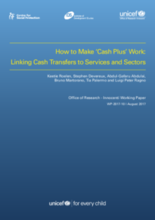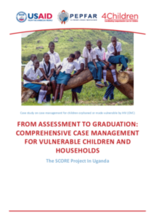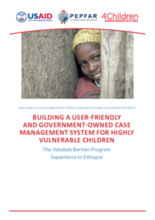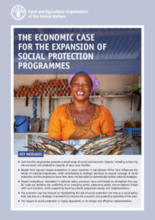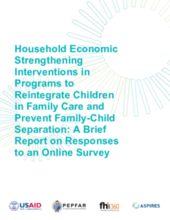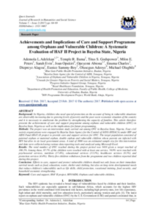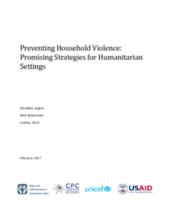Displaying 81 - 90 of 262
This paper aims to identify key factors for successful implementation of increasingly popular ‘cash plus’ programmes, based on (i) a review of the emerging evidence base of ‘cash plus’ interventions and (ii) an examination of three case studies, namely, Chile Solidario in Chile, IN-SCT in Ethiopia and LEAP in Ghana.
This study observes foster care re-entry for young people whose families participated in Cottage Housing Incorporated's Serna Village Program (CHI), a supportive housing program serving homeless families in Sacramento, California.
The 2017 Home Visiting Yearbook presents, for the first time, the most comprehensive picture available of home visiting on the national and state levels, revealing the breadth of home visiting in the United States and identifying the gaps in practice.
This case study describes the case management system developed by the Sustainable Comprehensive Responses for Vulnerable Children and their Families (SCORE) project in Uganda.
This case study describes the coordinated care and case management system for highly vulnerable children and their caregivers implemented by the Yekokeb Berhan program in Ethiopia.
This report summarizes evidence on six perceptions associated with cash transfer programming, using eight rigorous evaluations conducted on large-scale government unconditional cash transfers in sub-Saharan Africa, under the Transfer Project.
This brief brings together the critical mass of evidence emerging from recent rigorous impact evaluations of government-run cash transfer programmes in seven countries in sub-Saharan Africa.
In November 2015, ASPIRES launched an online survey of practitioners to identify potential sources of learning and to assess needs for improving the use of economic strengthening (ES) interventions in reintegration and prevention of separation programming. This brief report summarizes the findings of this survey.
This article presents the achievements of a care and support programme among orphans and vulnerable children (OVC) in Bayelsa State, Nigeria as well as the implications for future programming.
This report presents and reviews 43 interventions addressing household violence within the context of humanitarian emergencies, including a range of programs focused on parenting education and support and economic strengthening.

